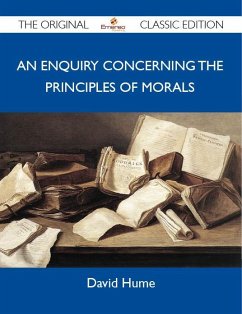An Enquiry Concerning the Principles of Morals (EPM) is one of the cornerstone texts in Western philosophy and is written with Humes characteristic combination of incisive analysis and charming style. Humes goal is to describe the bases of human moral conduct.
EPM is descriptive rather than prescriptive. While Hume clearly has strong opinions about what constitutes appropriate moral conduct, in EPM his focus is really on moral psychology rather than moral direction. This approach is what would now be called metaethical. As with his work on epistemology, Hume is also concerned with establishing the limits of human reason. In Humes analysis, reason has an important but limited role in moral judgements, crucial for reaching appropriate judgements but does not establish the basic principles for moral judgement.
Hume sees morality as based on an interesting interplay of moral sentiments, which he sees as intrinsic to human nature, self-interest, and social utility. The importance of each of these varies with considerably in different social settings. In family life and close personal relationships, moral sentiments dominate but the force of moral sentiment weakens as the range of socieity increases. In more complex social settings, Hume sees a form of utilitarianism as restraining self-interest. For Hume, specific moral systems are variable, somewhat situation dependent, and historically contingent.
Thought provoking and very readable.
EPM is descriptive rather than prescriptive. While Hume clearly has strong opinions about what constitutes appropriate moral conduct, in EPM his focus is really on moral psychology rather than moral direction. This approach is what would now be called metaethical. As with his work on epistemology, Hume is also concerned with establishing the limits of human reason. In Humes analysis, reason has an important but limited role in moral judgements, crucial for reaching appropriate judgements but does not establish the basic principles for moral judgement.
Hume sees morality as based on an interesting interplay of moral sentiments, which he sees as intrinsic to human nature, self-interest, and social utility. The importance of each of these varies with considerably in different social settings. In family life and close personal relationships, moral sentiments dominate but the force of moral sentiment weakens as the range of socieity increases. In more complex social settings, Hume sees a form of utilitarianism as restraining self-interest. For Hume, specific moral systems are variable, somewhat situation dependent, and historically contingent.
Thought provoking and very readable.
Dieser Download kann aus rechtlichen Gründen nur mit Rechnungsadresse in A, D ausgeliefert werden.


